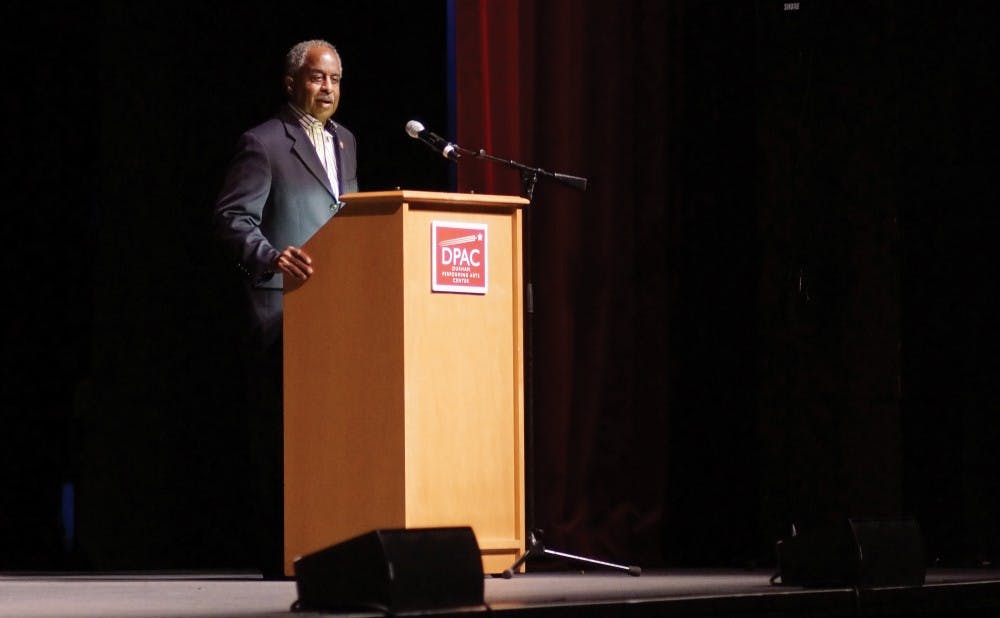“In 1963, five black undergraduate students integrated Duke University. Two of the five, Nat White Jr. and the late Mary Mitchell Harris, graduated from Hillside High School. Today we celebrate these trailblazers and the various leaders in Durham who broke segregated barriers to our theaters, lunch counters, ice cream parlors and educational institutions.”
These were the words that were printed on the back of the program at the event “Duke Celebrates Durham: Where Great Things Happened in 1963.” This was one of the many events that was put together to celebrate 50 years of black student integration at the University this weekend, which marks a year-long commemoration of desegregation. Attendees included Mayor William Bell, three of the first five black undergraduate students and President Richard Brodhead, among others.
The celebration was held at the Durham Performing Arts Center in downtown Durham and began with a performance from the 100 Men In Black Male Chorus called “Lift Every voice and Sing.” Marlon West and Alma Jones, Woman’s College ’68, orchestrated the song, which was followed by welcome greetings from Bell and Brodhead.
“Durham has really been a community that has grown over the ages,” Bell said. “Our community has a very rich African-American heritage and the good thing is that today we recognize part of it and I’m just pleased to be a part of it.”
Following Bell, Brodhead commented on how diversity transformed Duke into an elite institution.
“Duke recognized that education is about creating and opening opportunity, it’s not about opening it to some people and shutting it to others,” he said. “It recognized the fact that everybody learns and thrives better in a world where everyone is welcome rather than in a world where some are and some aren’t.”
After the remarks, there was a panel discussion moderated by Mark Anthony Neal, professor of African and African American studies. Panelists included Nathaniel White, Superior Court Judge Elaine Bushfan and Rev. William Turner—Pratt ’70, Divinity ’74 and Graduate School ‘84.
White, one of the first black undergraduates, said when he attended Duke, Durham was completely separate from the University—a city within a city.
“Duke is another city four miles away—it was a complete discovery,” White said. “I can’t express to you enough how much the town that I lived in and the town that I moved to were such separate enterprises—I didn’t know what I was to expect.”
Panelist Dr. Brenda Armstrong, Woman’s College ‘70 and Medicine ‘79, noted that it is important to ask questions to enforce change.
“If you don’t ask questions, things will remain the same,” she said.
Turner emphasized the growing need of intellect within the Duke community.
“Our state desperately needs thinking people,” he said. “The issue is not agreeing and disagreeing, it’s the intellect. It’s being able to think. It’s being able to analyze, it’s having a historical perspective and knowing what to do with issues.”
Ben Reese, vice president of the Office for Institutional Equity, said he was pleased with the event’s turnout after working for two years to create a memorable tribute to an important milestone.
“The whole event was very emotional,” Reese said. “We worked since 2011 to develop an event that would commemorate the 50th anniversary of black students at Duke.”
Get The Chronicle straight to your inbox
Signup for our weekly newsletter. Cancel at any time.

